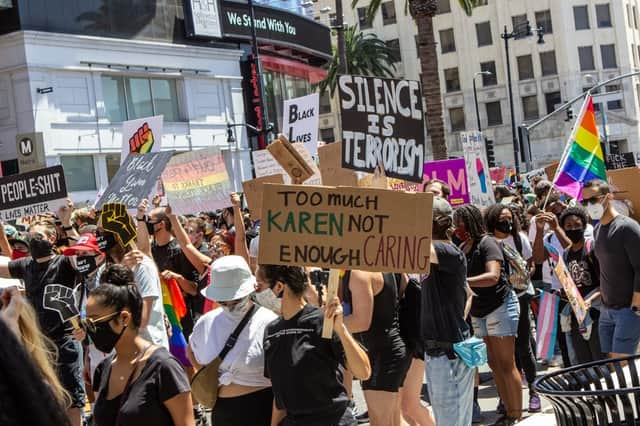Here's why the term 'Karen' became popular during the Black Lives Matter movement


One surprising development in the wake of 2020's Black Lives Matter protests has been the use of the name 'Karen' to signify an officious, entitled, white woman.
Its use has become so widespread on social media that businesses have jumped on the bandwagon.
Advertisement
Hide AdAdvertisement
Hide AdIn New Zealand, Domino's was offering people called Karen the chance to win a free pizza as a "break from negativity" (it eventually shuttered the promotion following widespread backlash).
There's even a sub-Reddit dedicated to the shaming of r/EntitledKarens.
But where did the new meaning of the name come from, and how did a seemingly innocuous first name come to be shorthand for rude, obnoxious and insufferable middle-aged white women who complain about things?
Here's everything you need to know:
What does Karen mean?
The name Karen first entered the English language hundreds of years ago from Danish, where it has been a short form of "Katherine" since medieval times.
Advertisement
Hide AdAdvertisement
Hide AdIt became popular in the English-speaking world in the 1940s, and has seen a resurgence in online mentions in recent years; but not for the reasons many people called Karen would like.
Why Karen?
One may assume the name's current usage sprung up following the story of a woman calling the police on a black birdwatcher in New York's Central park after he asked her to obey the rules around dogs on leads.
But the name's new connotations predate that story: there was the time a woman was dubbed a Karen after helping herself at a restaurant's server’s station in an impatient bid for condiments, and the story of a mum who was called a Karen for telling a woman wearing a bikini to cover up.
Rarely in those situations is the entitled person in question actually called Karen, so why has the name become attached to such instances?
Advertisement
Hide AdAdvertisement
Hide AdAccording to Robin Queen, Professor of Linguistics at the University of Michigan, "first names tend to contain a range of social cues.
"An obvious one is gender," Prof Queen said, writing for The Conversation. "But they can convey other kinds of information too, including age, ethnicity, religion, social class and geography.
"The first name Karen peaked in popularity in 1965, which means that in 2020, most people named Karen are middle aged.
"Because roughly 80% of the U.S. population was white in the 1960s, it’s safe to assume that the proportion of people named Karen in 2020 is predominantly white."
Advertisement
Hide AdAdvertisement
Hide AdProf Queen says it’s "largely a coincidence" that Karen – rather than another popular baby name from the 1960s – is the name that became the label, and the name's repeated use on social media has reinforced its status.
Where did the new use of 'Karen' come from?
A number of theories about the origins of Karen's current subtext have been put forward.
In African American communities, generic names have stood as shorthand for white women to be wary of due to their propensity to wield their privilege for a number of years.
A trend of posting pictures of white women calling the police on the everyday activities of black people emerged in 2018, each labelled with alliterative hashtags like #permitpatti and #cornerstonecaroline.
Advertisement
Hide AdAdvertisement
Hide AdAnother theory traces the use of Karen back to American comedian Dane Cook's 2005 skit in which he derided Karen as “that friend nobody likes.”
Karen - according to Cook - is entitled and “always a douche,” though Cook's angle seems to be void of racial critique and more focused on gender-stereotypes.
Another hypothesis points to the 2017 thread 'F*** You Karen', a parody of a Reddit user who ranted about his ex-wife (called Karen) receiving custody of their children and possession of the family home.
Central Park incident a 'perfect moment'
Those three ideas all seem to explain a different slice of the Karen pie.
Advertisement
Hide AdAdvertisement
Hide AdThe first deals with its racial connotations, the second with Karen's perceived entitlement, and the third with her pushy nature.
The Central Park incident earlier in 2020 fused all three together to form the Karen we know today, a "perfect moment" for the "strands to come together" says Prof Queen.
"There’s the intersection of entitled behaviour, racism and demographics."
What happened on This Morning?
The Karen debate reached a new head in Britain this week when This Morning viewers were left baffled as three Karens appeared to complain about the “racist” and “unfair“ use of their name.
Advertisement
Hide AdAdvertisement
Hide AdKaren Masters, Trigg and Serfass all appealed to viewers to stop using their name in a “negative“ way, a moment described as "the most Karen thing to do" by social media users.
"We can’t, as Karens, now talk about how this is affecting us because we are told we are entitled if we do this," said Masters. "I set up a Change.org to show this is not fair for us to put up with this."
"’People say Karens are entitled, but we’re not,’ insists Karen, who started a petition and went on the TV to complain about people using the name Karen facetiously, in what is perhaps the most Karen thing any Karen has ever Karened,” said one Twitter user.